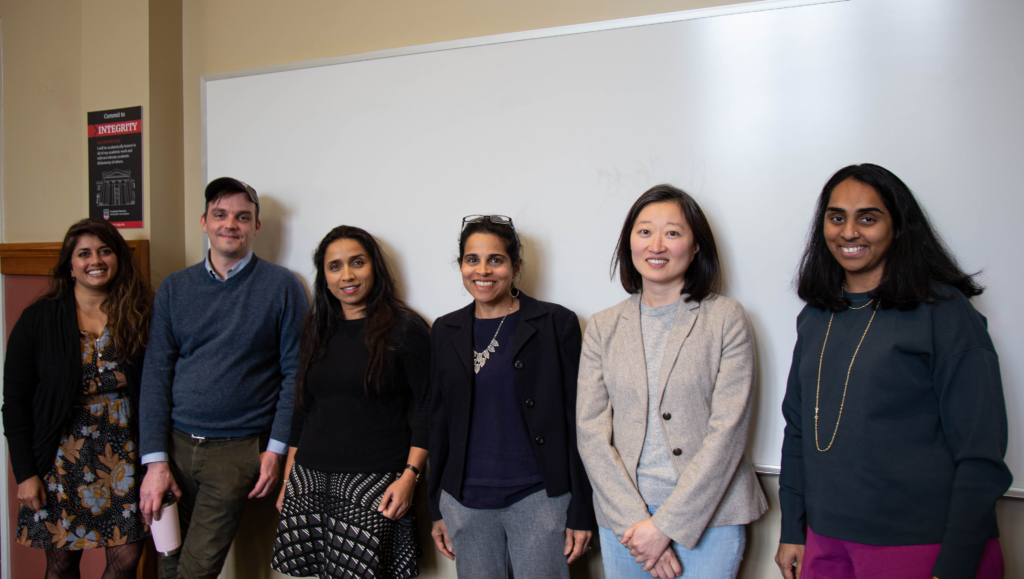The event opened with introductions from each panelist. Panelists included:
Dr. Rumya Putcha is the author of The Dancer’s Voice and Namaste Nation: Orientalism and Wellness Cultures in the United States. She is an assistant professor in the Institute for Women’s Studies and in the Hugh Hodgson School of Music. Her research is focused on the intersections of colonialism, music and feminism.
Dr. Jordan Pickett is an assistant professor and graduate coordinator in the Department of Classics. In 2022, he was part of an interdisciplinary team from UGA that conducted research at the Chimborazo volcano. Dr. Pickett is a co-director of a faculty-led study away program in Croatia studying its cultural heritage, including its art, classical civilization, and historic preservation.
Dr. Anna Abraham is an E. Paul Torrance Professor in the Mary Frances Early College of Education and Director of the Torrance Center for Creativity and Talent Development. She is an instructor in the doctoral neuroscience program in the UGA Integrated Life Sciences graduate program. Her research interests include the neuroscience and psychology of creativity and imagination.
Dr. Mi-Ryong Shim is an assistant professor in the Department of Comparative Literature. Dr. Shim’s research specializes in East Asian Cinema, East Asian Literature, and War in East Asian Film and Literature. She is a published Korean translator.
Dr. Kalyani Ramnath is an assistant professor in the Department of History and an assistant professor by courtesy in the School of Law. She is the author of Boats in a Storm, in which she writes about the legal disputes regarding immigration that happened in the aftermath of World War II.
Dr. Usha Rodriges, Interim Vice Provost for Academic Affairs and M.E. Kilpatrick Professor of Law moderated the discussion between panelists. She asked panelists to comment on the interdisciplinary aspect of the humanities, among other questions relating to how each panelist regards the humanities as a whole.
“Humanities research has this kind of fundamental interdisciplinary component, and I find that in my as I’m writing [my] book, again and again, I’m drawing from those kinds of relations,” Dr. Ramnath shared, “It’s incredible to be able to tell these stories.”
“Archaeology is a team sport,” Dr. Pickett said regarding his international research, “We all contribute different perspectives to a common problem.”
Several panelists were first- or second-generation immigrants; these panelists described this facet of their identity as integral to their perspective on the humanities. Panelists, including Dr. Rodriges, shared a background in studying Law which eventually led them to the humanities.

“I fell into this line of the career in humanities research by accident,” Dr. Shim shared. She shared that while in her undergraduate pre-law program, her required foreign language courses propelled her to explore her fascination with the history of civilization and the literary Canon of East Asian Culture.
The lively discussion continued with a Q&A session in which students inquired about the academic journeys of the panelists as well as how the humanities shape how they move through the world.
“I see myself first and foremost as a Humanities Scholar,” Dr. Abraham said regarding her wide range of work.
Global Stories was presented by the Morehead Honors College, the Center for Undergraduate Research Opportunities, the Office of the Provost, the Franklin College of Arts and Sciences, the Office of Global Engagement, the Willson Center for Humanities and Arts, and the UGA Humanities Council.
The Humanities Festival is an inaugural series of events that began in 2023. The festival seeks to highlight the diversity of the humanities and to spark curiosity about how humanities are present across intercultural communities and disciplines.
